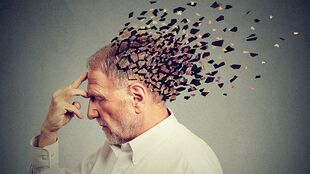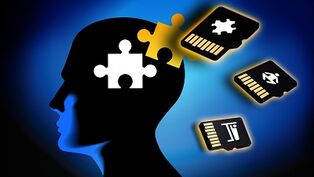
There are diametrically opposed views on substances that improve memory. Some say it is helpful and helps cope with increased intellectual stress that it really helps and effectively.
Others say that this is just a myth, that there is no benefit to taking these drugs, that it can even be harmful and addictive to these drugs. Let us try to consider both views in more detail and find out who is right.
A little about memory
Memory is a mental function of higher nervous activity, by means of which the accumulation, conservation and reproduction of previously received information occurs. Memory allows you to store information about the outside world or the body's reactions to any influence for a long time, and it also allows you to use this information for the correct organization of activities in the future.
Memory contains several different but related processes.
- Memorization- input of new data, sensations.
- Storage- accumulation of data, sensations include processing and assimilation of them. This process allows a person to learn, develop his thinking and speech.
- Reproduction and recognition- actualization of elements, actions, sensations from the past. Reproduction is involuntary (elements "flow" in a person's mind without his will and effort) and arbitrary.
- Forget- loss of the ability to reproduce and recognize previously remembered elements. It can be temporary or permanent. There is an incomplete forget when information is reproduced or recognized by mistake or in part.
Basic memory types
There are many types and subtypes in the memory classification. Let's talk about its main types.
- Sensory memory- preservation of information from the senses after stimulation of them.
- Tactile memory- preservation of information from receptors as a result of touch.
- Engine memory- information about the movement is stored, many people remember that there are movements that they perform automatically.
- Semantic memory- storing information about facts such as learned stories, dates, multiplication table.
- Short-term memory- stores information for a short time. Has a small volume.
- Long-term memory- storage of information indefinitely, including life.
Laws of Memory

Few people know that there are a number of memory laws. This is not an invention of the author, but real patterns established and proven scientifically.
- The Law of Repetition- information is remembered much better if it is repeated several times.
- Interesselov- if a person is interested in information, he will remember it faster and better.
- Edge of Law- the information provided at the beginning and end is best remembered.
- The Law of Understanding- if the information has been deeply understood, it will be remembered better.
- The law of optimal series length- the amount of remembered information should not exceed the amount of short-term memory.
- Installation Law- a person who has given himself the installation that he needs to remember this or that information will remember it faster and better.
- Inhibition Law- when one remembers similar concepts, the old information "overlaps" with the new one.
- Context Law- when you remember things that can be linked to already known concepts, it goes faster.
- The Law of Action- if what is remembered is used in practice, then memorization finds itself more efficiently and quickly.
These laws can be used if you want to remember something faster and better as well as to train your memory.
Causes of Memory Loss
- Organic Brain Injury- Acute Disruption of Brain Circulation, Traumatic Brain Injury, Brain Tumor.
- Diseases of other organs and systems- Diseases of the liver, the cardiovascular system.
- External factors- poor ecology, a sharp change in the surrounding conditions of existence, stress, sleep disorders.
- Age-related changes in brain structure- a decrease in the number of interneuronal connections.
- Chronic poisoning- smoking, drug use, drug abuse, alcoholism, drug abuse (sedatives, sedatives).
Treatment of impaired memory
Drugs are not prescribed immediately if memory improvement is needed. First, they try to use non-drug methods. These include:
- Brisk goes in fresh air. This increases oxygen access to the brain. This improves the efficiency of its work.
- Normalize sleepand wakefulness.
- Evening training- an unusual training can be a habit of remembering all the day's events in reverse order, ie. first of all to remember what happened in the evening and at the end - the morning events. It is better to do this before bedtime, lying in bed.
- Positive attitude, do not dwell on this- do not think you have a bad memory, no one canceled the effect of self-hypnosis. If at some point you can not remember anything, do not worry, do not get angry, but just get distracted, do something else, and then try again to remember what you have forgotten.
- Daily training- solve crossword puzzles, riddles, scan words.
- Education- learn poetry, foreign languages, do it regularly, gradually increase the amount of material you learn.
Medicine for memory loss

It is clear that learning poetry, a foreign language, that solving riddles is not easy, you have to "strain", for walks and solving riddles you have to set aside extra time that a working person practically does not have.
It's much easier to take a pill, calm down and hope for the magic power of medicine - your memory immediately improves and you do not have to do anything! The modern city dweller is so lazy and spoiled by the fruits of civilization that few people are now so determined and want to spend their time and energy training memory. So a person is looking for an answer to his question - what memory enhancement pills are there?
So let's consider two opposing views on this issue:
Positive opinion
Proponents of the use of these drugs say that a number of drugs help to improve the blood supply to brain cells, thereby improving their nutrition and providing more oxygen, which improves metabolic processes in neurons.Nootropics and drugs that improve the rheological properties of blood help with this.
Herbal preparations have become widespread, which not only improves metabolic processes in neurons per se, but also enhances the effect of nootropic drugs.
However, it should be remembered that any (absolutely any) drug has its own contraindications and side effects, therefore it should only be prescribed by a doctor in each specific clinical case.
Negative statement
According to a number of experts, there is also a disadvantage to the coin. Several years ago, experts were confused over the question - are these drugs effective, or is it just a placebo effect?
As a result of several studies, the efficacy of nootropics has not been proven. There is no evidence that they have a beneficial effect on memory. One of the small studies on the effectiveness of medicines has proven that they have little effect, but not in severe cases.
Traditional methods and herbal remedies, such as ginseng, vitamin E, have virtually no research. The evidence base is only for the use of herbal remedies in patients with dementia. However, there are no data on the effectiveness of the use in relatively healthy people.
In conclusion, I would like to say that when you think about which drugs are best for improving memory, do not forget that they need to be prescribed by a doctor. And the doctor should also evaluate the effectiveness in each case. Do not rely on advice from friends, neighbors or family.
If you think your memory has deteriorated, consult a neurologist. Maybe this is not the problem at all, the attention can be disturbed, there may be some other problems. It is also necessary to find out the cause of this condition. And this can only be performed by a qualified doctor.







































































